Digital Event, 18 March 2021
Rebuilding Trust
Horasis held its second digital Extraordinary Meeting on 18th March 2021, focusing on the United States of America. The United States of America inaugurated its new President at an important moment of world history. Under the theme Rebuilding Trust, 1100 of the most senior members of the Horasis Visions Community – including several heads of governments and key ministers – we offered the opportunity to shape America’s and the world’s agenda. With its 200 sessions, the Horasis Extraordinary Meeting on the United States of America was the largest online meeting held by any organization so far.
The discussions through the meeting covered a wide range of issues and delegates endeavored to generate novel solutions pertaining to the difficulties facing us all at the present time, especially with respect to the effects of the COVID pandemic pushing heavily on all. Before the onset of COVID there was pressure to support all the disenfranchised, to meet global needs pertaining to diversity, to meet the Sustainable Development Goals, and to meet the climate change targets. These have not diminished, but governments’ spending on fiscal and monetary policies to lessen the effects of COVID have created extra tensions to be addressed.
The new US Administration, led by President Joe Biden, has had much to do in its early days. Politicians are often scrutinized on their successes during their initial 100 days in office; or more likely, for their failures. President Biden’s situation was made more than usually difficult as he had to quickly deliver a solution for the COVID pandemic affecting the health, well-being and the economy of US citizens and businesses. At the same time, he and his cabinet had to revise the political strategies and tactics pertaining to the management of the US at home and abroad following earlier government actions and edicts. Many discussions at the Horasis Extraordinary Meeting hinged upon the work of the new administration. Raja Krishnamoorthi, Congressman for Illinois, USA said Biden is well-regarded – so bi-partisan discussions can begin as both parties re-learn to do their business jointly. Susan Bysiewicz, Lieutenant Governor, State of Connecticut, USA agreed, and said they must focus on the reform for the state electoral system.
Barbara Lee, Congresswoman for California, USA emphasized that within the $2t Stimulus Bill achieving racial equity is important and US can lead, and incidentally make national near-neighbors safer – then with the economic stimuli that follows, healthier. She acknowledged there was a lot of work to do globally. Illustrating the vibrant mixtures across the US, Indra Nooyi, Member of the Board, Amazon, USA stated that the US must look to its allies, or rebuild allies in regions recently ignored, such as Latin America.
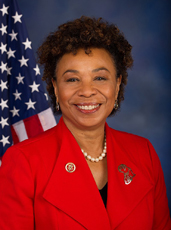 |
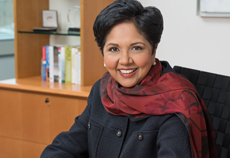 |
| Barbara Lee, Congresswoman for California, USA | Indra Nooyi, Member of the Board, Amazon, USA |
Chan Santokhi, President of Suriname noted his nation will develop new links – initially bi-laterally then multi-laterally. As a President freshly elected, he thinks it will take about 2 years to create internal coherence, then Suriname will be seen by international traders as a good place to be working. Arnaldo Castillo, Minister of Economic Development, Honduras stressed that relations with the US are very important. Much is being done to be more attractive for inward investment and to counteract drugs routes through Latin America. Pedro Pierluisi, Governor of Puerto Rico, USA emphasized the US-linked role of Puerto Rica, being a US territory with US laws that ought to raise investors’ confidence. The big challenge short-term is the pandemic, but he has confidence in the future – partly as 20% global medical supplier firms are located there, and its geo-location is often closer to global destinations rather than the internal US states: it might mimic the development of Dubai as a trade entrepôt.
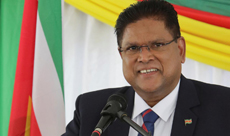 |
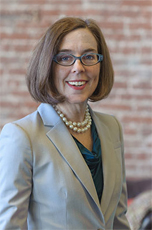 |
| Chan Santokhi, President of Suriname | Kate Brown, Governor of Oregon |
Buoyed by good news of the control of COVID, the stock market looks to the future with confidence. Investors buy into the idea that the US is rapidly recovering and will resume its many global leadership roles. But many delegates who were only cautiously optimistic noted a great variety of systemic issues that require attention. Brendan Boyle, Congressman for Pennsylvania, USA said that building a domestic consensus in US will be more difficult than rebuilding with overseas nations. To aid the former, we must reach out to our neighbors to become better connected, to better understand the issues, and to search for robust solutions. Another instance of local boosting came from Megan J. Smith, Founder and Chief Executive Officer, shift7; and Former Chief Technology Officer of the United States, USA who noted how getting fiber to the homes across the US will engage the population and enable a deeper understanding of what Armen Sarkissian, President of Armenia, called the ‘quantum’ development of the future. The future is not predicated only on step-changes (like the fiber initiative) but on the continued investment in education, becoming wiser ‘globally, and creating deep visions for the people. He noted “It is a new world now – we have not got to the end of history”.
Building and repairing the old infrastructure across the US will be further step. The $2 trillion ‘Infrastructure Bill’ will instigate a sense of pride and development inside the US. Richard Blumenthal, Senator from Connecticut, USA suggested the Bill will be revolutionary yet historic: permitting the US entrepreneurs to ‘Speed up America’ and be well positioned to help the world. Kate Brown, Governor of Oregon, USA thought the Bill will build trust with the US people and change the federal role dynamic in US. She stated the US center will become more responsive to broad issues and that it will better understand the difficulties of individual states: such as ‘inclusivity’. Michael Froman, Vice Chairman, Mastercard, USA opined that before COVID firms were considering the broader role of the corporation, then COVID forced action to be taken. Thus, Mastercard was considering ‘inclusion’ well before COVID to bring the un-banked into FinTech so embrace the digital economy.
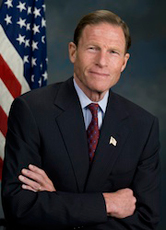 |
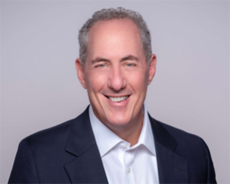 |
| Richard Blumenthal, Senator from Connecticut, USA | Michael Froman, Vice Chairman, Mastercard, USA |
Chad O. Holliday, Chairman, Shell, The Netherlands looked at COVID-19 as an amplifier of strengths and weaknesses. We now are much faster at developing solutions; which was supported by Janet Foutty, Executive Chair, Deloitte, USA who suggested COVID accelerated development by possibly 5-years across all organizations. Steve Case, Chairman and Chief Executive Officer, Revolution, USA stated in 2020 50% of entrepreneurial (teaching) programmes are taken by women so they should be able to command future investment – it’s a time-based thing – enacting diversity. However, we must support investment to create value – not valuation (ie the unicorns, were invested in to be sold). Jim Clifton, Chief Executive Officer, Gallup, USA considered human development is most likely to occur in the workplace, finding that a good manager would stimulate previously low performing staff: the trick is to get a good match.
Importantly, many discussants thought the US discussions with China on tariffs and embargos must find solutions quickly, as both these major economies rely strongly on each other and are linked by many intermediaries: business managers like stability. From the viewpoint of the US, the Trans-Atlantic and the Trans-Pacific alliances (but more so, The Quad) will need careful trust-building to ensure a solid foundation for future cooperation. To an extent we must rely on International Institutions to bridge negotiations.
Miguel de Serpa Soares, Under-Secretary-General for Legal Affairs and UN Legal Counsel, United Nations suggested it was not sensible to rely solely on US as a ‘rights monitor and major funder’ – China and all nations must pull together to support global discussions. Although all nations focus on their individual issues it is only UN that takes a wide view. So, the international institutions, not only the UN, but IMF, WHO and so on must remain relevant, making dynamic changes to meet the future. Considering Europe, Jenny Gilruth, Minister for Europe and International Development Government of Scotland, UK wondered if the US lost its sense of being the center of Western alliances through the Trump years. Rebuilding and enhancing joint Europe/US sentiment will take longer than the first Biden term but it will take place. The global COVID cooperation has shown good aspects of co-working as it is better to work together than have strong leverage on each other. Biden has to mend the US internally before re-building the global diplomacy.
Much of the rebuilding domestically and internationally is a ‘people thing’. Rania A. Al-Mashat, Minister of International Cooperation, Egypt accepted we must collaborate as alone is weak. While the present government stimuli are often aimed first at COVID management then sustainability, we need more pressure by people to broaden the conversation to include all the SDGs, climate change and detailed social issues. We must avoid confrontation – instead, to communicate and raise trust. Ibukun Awosika, Chair, First Bank of Nigeria, Nigeria he has learned over the last year we need to be sure that everyone is taken care of. There is a differentiated economic progress over globe – US well ahead, many behind: this situation needs time to change and the issues will slow the US. The biggest challenge is to think of our people – getting back to work, and so on which is dependent on inter-national links, diplomacy, and businesses.
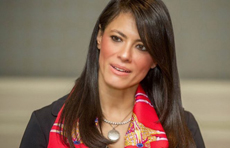 |
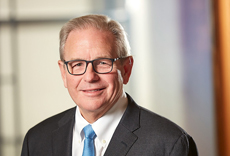 |
| Rania A. Al-Mashat, Minister of International Cooperation, Egypt | Chad O. Holliday, Chairman, Shell, The Netherlands |
Discussions have become strident with strong opinions voiced across a wide spectrum on many digital channels. Jimmy Wales, Founder, Wikipedia, USA addressed an issue central to this discussion – who is responsible beyond the issuer for the words we see and hear on all the media? He noted our flexibility to monopolistic curations – we all accept limitations on the apps in Apple or Android, but cry for freedom for Windows apps. A far better target for Regulators is curating intellectual property.
There was clear understanding through the meetings’ discussions that we all had to rebuild trust. It is an ephemeral notion; clear when one has it, confusing when it is lost. It has to be rebuilt by governments as the people perceive the politicians have informed them falsely over the effects and management of COVID. The mixed perception grew as people were fearful of what the future might hold as they were furloughed, told to work from home, or simply ‘put on hold’. Politicians were also confused, but held to the idea they must offer hope and not hard scientific facts, which initially were lightweight. The best advice was to self-isolate – be at home and have no contact with others to reduce the transmission rate of the virus. That rapidly impacted on mental health causing further difficulties in rebuilding trust. Now, as COVID management is developing across the rich world we must care for all in the developing world to pass on the best solutions. And governments, civic institutions, and the management of firms must re-establish trust by their clarity of thought and action. By building trust from an admitted low base, we can reach to the redevelopment of international trust, and though that reduce confrontation.
Co-chairs from the US:
| Steve Case, Chairman and Chief Executive Officer, Revolution, USA | |
| Jim Clifton, Chief Executive Officer, Gallup, USA | |
| Janet Foutty, Executive Chair, Deloitte, USA | |
| Lynn C. Fritz, Proprietor, Lynmar Estate, USA | |
| Michael Froman, Vice Chairman, Mastercard, USA | |
| Margery Kraus, Founder and Executive Chairman, APCO Worldwide, USA | |
| Hank McKinnell, Chairman, Moody’s, USA | |
| Dambisa Moyo, Member of the Board, 3M and Chevron, USA | |
| Indra Nooyi, Member of the Board, Amazon, USA | |
| Alan Patricof, Co-founder and Chairman, Primetime Partners, USA | |
| Rima Qureshi, Chief Strategy Officer, Verizon, USA | |
| Michael Shvo, Chairman and Chief Executive Officer, SHVO, USA | |
| Tom Siebel, Chairman and Chief Executive Officer, c3.ai, USA | |
| Jimmy Wales, Founder, Wikipedia, USA | |
| Jane Wurwand, Founder, Dermalogica, USA | |
| Samuel Zell, Founder and Chairman, Equity Group Investments, USA | |
Co-chairs from elsewhere:
| Bo Inge Andersson, President, Yazaki North and Central America, Europe and Africa, Japan | |
| Ibukun Awosika, Chair, First Bank of Nigeria, Nigeria | |
| Lord Barker of Battle, Executive Chairman, En+ Group, United Kingdom | |
| Lord Karan Bilimoria, President, Confederation of British Industry, United Kingdom | |
| Aiman Ezzat, Chief Exective Officer, Capgemini, France | |
| Kris Gopalakrishnan, Chairman, Axilor Ventures and Co-founder, Infosys, India | |
| Chad O. Holliday, Chairman, Shell, The Netherlands | |
| Cherie Nursalim, Vice Chair, GITI Group, Indonesia | |
| David de Rothschild, Founder, Voice for Nature, United Kingdom | |
| Murat Seitnepesov, Chairman, Caspian Week, Switzerland | |
| Vinod Sekhar, Chairman and Group Chief Executive Officer, Petra Group, Malaysia | |
| Zhi Peng, President, Tsinghua Asset Management Group, China |
About Horasis:
Horasis – a global visions community committed to inspiring our future – provides a unique platform for companies from emerging and developed markets to globalize their organisations. In addition to the Horasis Extraordinary Meeting, Horasis hosts the annual Horasis Global Meeting, Horasis India Meeting, Horasis China Meeting, Horasis Asia Meeting, as well as the annual gatherings of the Horasis Visionary Circle.
This pandemic has to be resolved for us all to concentrate on globally important issues like the SDGs, climate change; and as nations rebuild their economies devastated by COVID they must address gender equality and diversity in all its forms.
António Guterres, Secretary-General of the United Nations
Every company should accept a Clean Energy Dividend to be imposed on the carbon emissions they cause.
Richard Branson, Founder, Virgin Group, United Kingdom
Dialogue and global coordination is of vital importance in those times of health and socio-economic crises.
Armen Sarkissian, President of Armenia
We hope to revive the economy with investments in wind and solar energy.
Hage G. Geingob, President of Namibia
We need to be on the forefront of health support for employees and clients.
Roshni Malhotra, Chairperson, HCL Technologies, India
The coronavirus pandemic has exposed global fragilities and underscored the importance of a coordinated effort.
Mukhtar Tileuberdi, Minister of Foreign Affairs, Kazakhstan
We need to work against racism. And we need to listen and truly understand what the underlying problems of racism are.
Hans Vestberg, CEO, Verizon Communications, USA
To combat COVID, Rwanda quickly adopted mass testing and tracing as well as containment measures.
Soraya M. Hakuziyaremye, Minister for Trade and Industry, Rwanda
The effects of the COVID pandemic would have been more difficult for Egypt if not for the comprehensive reforms on taxes, budgets and foreign exchange that the country undertook.
Rania A. Al-Mashat, Minister of International Cooperation, Egypt
Benin and other nations must change the ways in which Africa does business: to develop objectives for each nation and then between nations to define the strengths and objectives to reach global markets.
Aurélien Agbénonci, Minister of Foreign Affairs, Benin
Colombia will continue the ‘green thrust’ by increasing sources of clean energy.
Diego Mesa, Minister of Mines and Energy, Colombia
The way in which we work together needs to change to overcome the profound economic, political and social disruptions caused by COVID-19, in Latin America and elsewhere.
Paul Oquist Kelley, Minister of Presidency and National Policies, Nicaragua
South Asia has high potentials for the future, though presently depressed by the on-set of COVID.
Pradeep Kumar Gyawali, Minister for Foreign Affairs, Nepal
We need to regenerate support for inequality across the globe. In vulnerable societies this must arise from strong social protection of all individuals, especially women and children who are often the most deprived.
Michelle Bachelet, United Nations High Commissioner for Human Rights